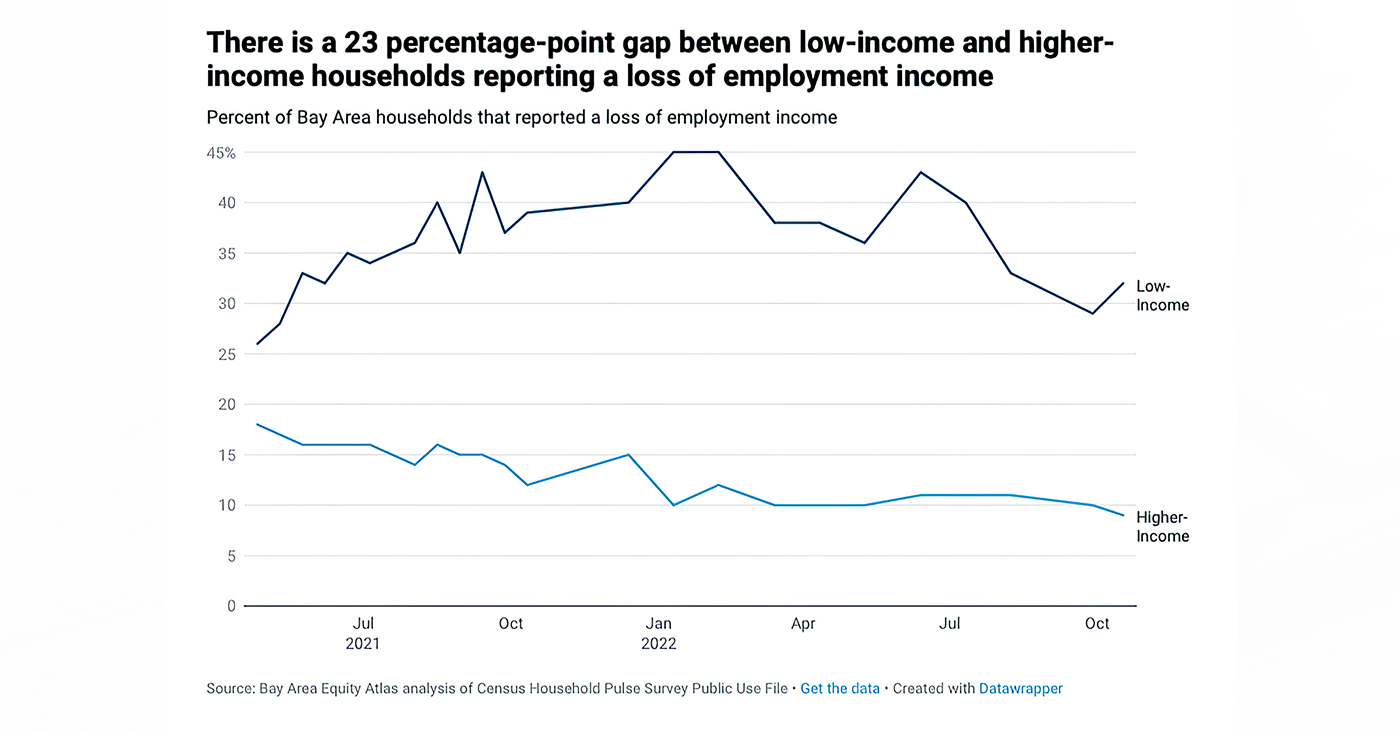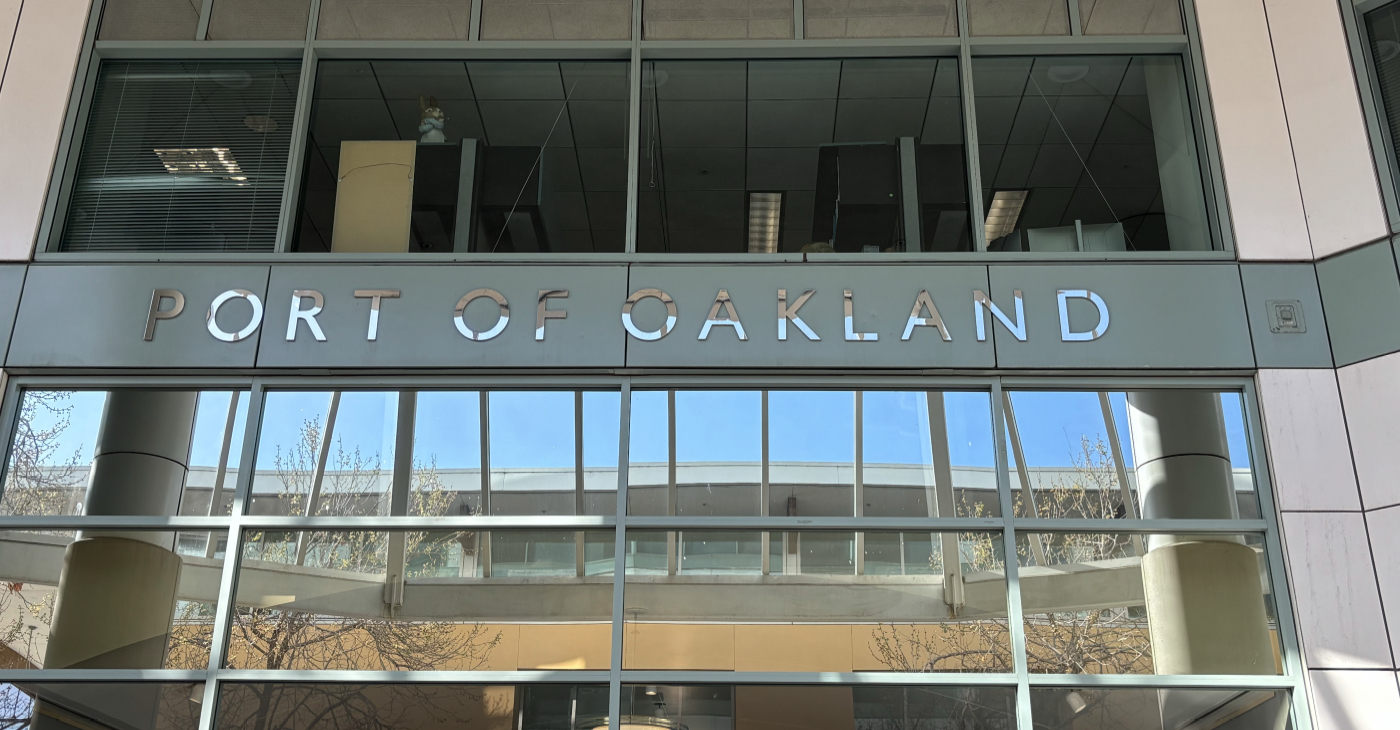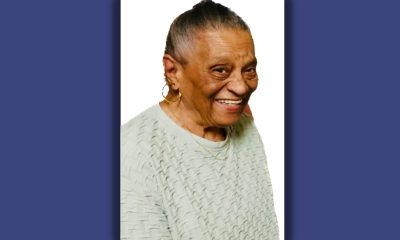Bay Area
Data Shows Some Bay Area Populations Struggling Financially in Post-COVID Economy
As the Bay Area’s economy continues its up-and-down recovery from the worst effects of the COVID-19 pandemic, recent data shows that many low-income households and communities of color are getting left behind. In a January report based on data analyzed via the “Bay Area Recovery Tracker” online tool, the Bay Area Equity Atlas found that despite some promising economic gains, the hope that a rising tide would lift all boats appears to be floundering.

By Kiley Russell
Bay City News
As the Bay Area’s economy continues its up-and-down recovery from the worst effects of the COVID-19 pandemic, recent data shows that many low-income households and communities of color are getting left behind.
In a January report based on data analyzed via the “Bay Area Recovery Tracker” online tool, the Bay Area Equity Atlas found that despite some promising economic gains, the hope that a rising tide would lift all boats appears to be floundering.
“We’re finding this consistently, that low-income adults and people of color are continuously struggling to cover their usual expenses,” said the report’s author Simone Robbennolt.
The report found that six in 10 low-income adults in the Bay Area — people living in households earning less than $50,000 a year — and almost half of adults of color still report having a somewhat or very difficult time paying for usual expenses, compared to 21 percent of white people and 22 percent of people with higher incomes.
“That’s anything from buying groceries to paying house and utility bills or just keeping up with monthly card payments, and so we’re seeing consistently that this number is not really shifting and we’re kind of seeing almost a stagnation for some of these indicators where we would want to see progress almost three years out, four years out,” said Robbennolt, an associate with PolicyLink, which produces the Bay Area Equity Atlas along with the San Francisco Foundation and University of Southern California’s Equity Research Institute.
This comes amid an environment where many economic indicators continue to show some promise, despite worries over inflation, rising interest rates and tech-sector layoffs.
For example, data from the U.S. Department of Commerce shows that gross domestic product is estimated to have increased by 3.2 percent nationally in the third quarter of 2022 compared to the previous quarter and by 2.7 percent in the fourth quarter.
Also, gross domestic product — the value of goods and services produced in specific areas — increased by nearly 4 percent in California during the third quarter, with personal income growth hitting 5.2 percent in the state.
But by October 2022, 26 percent of people of color in the Bay Area reported a loss of income due to job loss or a reduction in hours or wages, while just 8 percent of white people reported a similar loss of income, according to data incorporated into the Equity Atlas dashboard from the U.S. Census Household Pulse Survey.
“We’re also seeing a gap widening between lower-income and higher-income households experiencing loss of employment income,” Robbennolt said. “When the pandemic first hit, there was about an 8 percentage point gap between these two groups and since then it’s increased threefold and we’re seeing a 23 percentage point gap.”
This appears to show that while higher-income white people are steadily recovering from the worst of the COVID downturn, lower-income people of color are heading in the opposite direction, despite some efforts to ensure an equitable economic recovery with policies like direct COVID relief payments and expanded unemployment benefits.
The report points out that there have long been “stark differences in income inequality” in the Bay Area, where income grew by 69 percent for very-high-wage earners and by 53 percent for high-wage workers from 1980 to 2019.
During the same period, income grew by 17 percent for middle-income workers and actually dropped by 2 percent for low-wage earners and 9 percent for very-low-wage earners.
“The pandemic, in a lot of ways, laid bare a lot of the existing inequities and made a lot of them worse,” said Louise Auerhahn, director of economic and workforce policy at Working Partnerships USA, a Silicon Valley organization that works to foster a more equitable regional economy, among other things.
It was “forcibly brought home” during the pandemic that the majority of jobs deemed essential — things like retail, food service and long-term care — are not well compensated or “valued in proportion to the value they bring to the economy,” Auerhahn said.
“The overwhelming majority of those in-person essential jobs are done by workers of color, immigrants and women in the Bay Area,” she said.
This phenomenon of “occupational segregation,” wherein workers of color are overrepresented in low-wage and low-quality jobs, is a consistent factor in the region’s racial pay gaps, according to the report.
For example, in San Mateo County, Latino workers account for 25 percent of the total working-age population but make up 74 percent of building and grounds cleaning and maintenance workers, while white workers are 38 percent of the working population and hold 54 percent of management jobs.
To help lower-wage workers keep afloat during the pandemic, many federal, state and local governments implemented a variety of emergency policies, including food assistance, expanded unemployment benefits, direct payments and utility shutoff and eviction moratoriums.
“There’s a lot of data that those worked, that they really reduced poverty and people entering homelessness,” Auerhahn said. “But all of those are ended or are ending. It’s quite likely to get a lot worse in the next year if we don’t take some actions to mitigate the end of these supports that have helped people hang on.”
The report suggests several policies that could help foster a more equitable economic recovery, including implementation of a living wage, ensuring workers have health care, paid leave, retirement accounts and stable working environments, as well as ensuring people have the right to unionize.
“I think a lot of things are still in flux and there’s still an opportunity to make (the recovery) more equitable,” Auerhahn said. “You have to understand that our economy, as it is now, as it was before the pandemic, is very deeply and structurally inequitable, so if we proceed with business as usual it’s going to increase inequality.”
A link to the full report can be found at https://bayareaequityatlas.org/recovery-tracker/economic-security.
Copyright © 2023 Bay City News, Inc. All rights reserved. Republication, rebroadcast or redistribution without the express written consent of Bay City News, Inc. is prohibited. Bay City News is a 24/7 news service covering the greater Bay Area.
Activism
Oakland Post: Week of April 17 – 23, 2024
The printed Weekly Edition of the Oakland Post: Week of April 17 – 23, 2024

To enlarge your view of this issue, use the slider, magnifying glass icon or full page icon in the lower right corner of the browser window. ![]()
Activism
Oakland Schools Honor Fred Korematsu Day of Civil Liberties
Every Jan. 30, OUSD commemorates the legacy of Fred Korematsu, an Oakland native, a Castlemont High School graduate, and a national symbol of resistance, resilience, and justice. His defiant stand against racial injustice and his unwavering commitment to civil rights continue to inspire the local community and the nation. Tuesday was “Fred Korematsu Day of Civil Liberties and the Constitution” in the state of California and a growing number of states across the country.

By Post Staff
Every Jan. 30, OUSD commemorates the legacy of Fred Korematsu, an Oakland native, a Castlemont High School graduate, and a national symbol of resistance, resilience, and justice.
His defiant stand against racial injustice and his unwavering commitment to civil rights continue to inspire the local community and the nation. Tuesday was “Fred Korematsu Day of Civil Liberties and the Constitution” in the state of California and a growing number of states across the country.
One OUSD school is named in his honor: Fred T. Korematsu Discovery Academy (KDA) elementary in East Oakland.
Several years ago, founding KDA Principal Charles Wilson, in a video interview with anti-hate organization “Not In Our Town,” said, “We chose the name Fred Korematsu because we really felt like the attributes that he showed in his work are things that the children need to learn … that common people can stand up and make differences in a large number of people’s lives.”
Fred Korematsu was born in Oakland on Jan. 30, 1919. His parents ran a floral nursery business, and his upbringing in Oakland shaped his worldview. His belief in the importance of standing up for your rights and the rights of others, regardless of race or background, was the foundation for his activism against racial prejudice and for the rights of Japanese Americans during World War II.
At the start of the war, Korematsu was turned away from enlisting in the National Guard and the Coast Guard because of his race. He trained as a welder, working at the docks in Oakland, but was fired after the bombing of Pearl Harbor in 1941. Fear and prejudice led to federal Executive Order 9066, which forced more than 120,000 Japanese Americans out of their homes and neighborhoods and into remote internment camps.
The 23-year-old Korematsu resisted the order. He underwent cosmetic surgery and assumed a false identity, choosing freedom over unjust imprisonment. His later arrest and conviction sparked a legal battle that would challenge the foundation of civil liberties in America.
Korematsu’s fight culminated in the Supreme Court’s initial ruling against him in 1944. He spent years in a Utah internment camp with his family, followed by time living in Salt Lake City where he was dogged by racism.
In 1976, President Gerald Ford overturned Executive Order 9066. Seven years later, the 9th Circuit Court of Appeals in San Francisco vacated Korematsu’s conviction. He said in court, “I would like to see the government admit that they were wrong and do something about it so this will never happen again to any American citizen of any race, creed, or color.”
Korematsu’s dedication and determination established him as a national icon of civil rights and social justice. He advocated for justice with Rosa Parks. In 1998, President Bill Clinton gave him the Presidential Medal of Freedom saying, “In the long history of our country’s constant search for justice, some names of ordinary citizens stand for millions of souls … To that distinguished list, today we add the name of Fred Korematsu.”
After Sept. 11, 2001, Korematsu spoke out against hatred and discrimination, saying what happened to Japanese Americans should not happen to people of Middle Eastern descent.
Korematsu’s roots in Oakland and his education in OUSD are a source of great pride for the city, according to the school district. His most famous quote, which is on the Korematsu elementary school mural, is as relevant now as ever, “If you have the feeling that something is wrong, don’t be afraid to speak up.”
Bay Area
Port of Oakland Commission Votes to Change Oakland Airport to ‘San Francisco Bay Oakland International Airport’
The Port of Oakland Commission voted unanimously to change the name of Metropolitan Oakland International Airport to San Francisco Bay Oakland International Airport at a commission meeting Thursday afternoon. The Port initially announced the name change on March 29, claiming that the change will attract more passengers and enhance the airport’s visibility. They contend that the airport often gets neglected by the public’s lack of knowledge of Oakland’s proximity to San Francisco.

By Magaly Muñoz
The Port of Oakland Commission voted unanimously to change the name of Metropolitan Oakland International Airport to San Francisco Bay Oakland International Airport at a commission meeting Thursday afternoon.
The Port initially announced the name change on March 29, claiming that the change will attract more passengers and enhance the airport’s visibility. They contend that the airport often gets neglected by the public’s lack of knowledge of Oakland’s proximity to San Francisco.
“We want people to know where Oakland is and how beautiful our city is. We want them to visit, we want them to spend their money, and we want to keep our money into our local economy,” Port Commission President Barbara Leslie said at the meeting.
The commissioners shared anecdotal experiences and research to explain how this new name change will elevate and add to the growth of Oakland, not take away from their Bay Area neighbors.
The Port claimed that local residents had been asking for more options in domestic and international flights, but in order to do that, outside travelers need to be aware of Oakland’s presence first.
Since the announcement of the new name, San Francisco leaders strongly opposed the suggestion for a change, the City Attorney going as far as threatening legal action.
SF City Attorney David Chiu announced Monday that his team sent a letter to the Port of Oakland, writing that if Oakland goes forward with the name change, the city will go forward with a lawsuit to prevent the use of their trademarked name.
San Francisco owns U.S. federal trademark registrations for the marks “San Francisco International Airport”, the letter says.
Chiu further claimed that the name change will only cause confusion and chaos for travelers who are used to seeing the San Francisco name in the SFO trademark.
“We want to see the entire Bay Area thrive as a tourist destination and expand our offerings to visitors, but this proposal is not a legal or practical way to go about it. If Oakland moves forward with this proposal, San Francisco will pursue legal action to prevent misuse of our trademark,” Chiu said.
SF Mayor London Breed joined Chiu’s letter, stating that Oakland does not need to add the internationally popular city to its brand in order to grow its services.
“[Oakland] is rich in culture and wonderful people and has its own unique identity. It does not need the name San Francisco as part of its airport to stand out,” Breed wrote.
The Port defended its proposed actions, saying that if the vote did go forward, they would “take all appropriate measures to defend its right to use this accurate geographic identifier.”
“The proposed name modification will clarify, not confuse. The new name identifies where OAK is actually located, which is on the San Francisco Bay,” a spokesperson said on behalf of the Port.
Support for the name change extends beyond the Port. Several regional leaders, airlines and community members have come out in support of the name change, including Oakland Mayor Sheng Thao.
“This adjustment isn’t just about signage—it’s about inviting travelers to discover all that Oakland and the region have to offer. From our local dining scene to unique shopping spots and cozy hotels, there’s something here for everyone. Let’s work together to ensure that Oakland Airport continues to serve as a welcoming gateway for visitors and a source of pride for our community,” Thao said.
Because of public outcry amongst residents and leaders in Oakland and San Francisco before and during the Commission meeting, the Board decided to extend the second reading for the proposed name change from the end of April to the first meeting in May. This decision will allow commissioners to connect with community groups and leaders over their concerns for the change.
The Port Commission is scheduled to hold a second reading of the proposed name change on May 9.
-

 Activism4 weeks ago
Activism4 weeks agoOakland Post: Week of March 20 – 26, 2024
-

 #NNPA BlackPress3 weeks ago
#NNPA BlackPress3 weeks agoCOMMENTARY: D.C. Crime Bill Fails to Address Root Causes of Violence and Incarceration
-

 #NNPA BlackPress3 weeks ago
#NNPA BlackPress3 weeks agoMayor, City Council President React to May 31 Closing of Birmingham-Southern College
-

 #NNPA BlackPress3 weeks ago
#NNPA BlackPress3 weeks agoCOMMENTARY: Lady Day and The Lights!
-

 #NNPA BlackPress3 weeks ago
#NNPA BlackPress3 weeks agoFrom Raids to Revelations: The Dark Turn in Sean ‘Diddy’ Combs’ Saga
-

 #NNPA BlackPress3 weeks ago
#NNPA BlackPress3 weeks agoBaltimore Key Bridge Catastrophe: A City’s Heartbreak and a Nation’s Alarm
-

 #NNPA BlackPress3 weeks ago
#NNPA BlackPress3 weeks agoBaltimore’s Key Bridge Struck by Ship, Collapses into Water
-

 Activism3 weeks ago
Activism3 weeks agoOakland Post: Week of March 27 – April 2, 2024














































